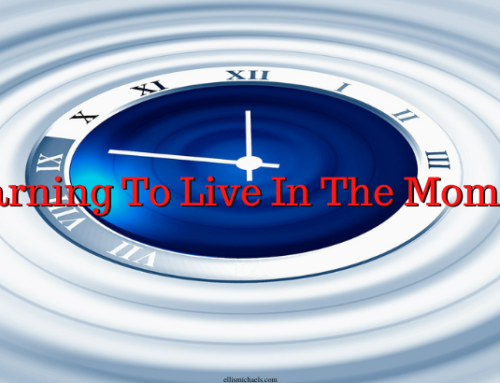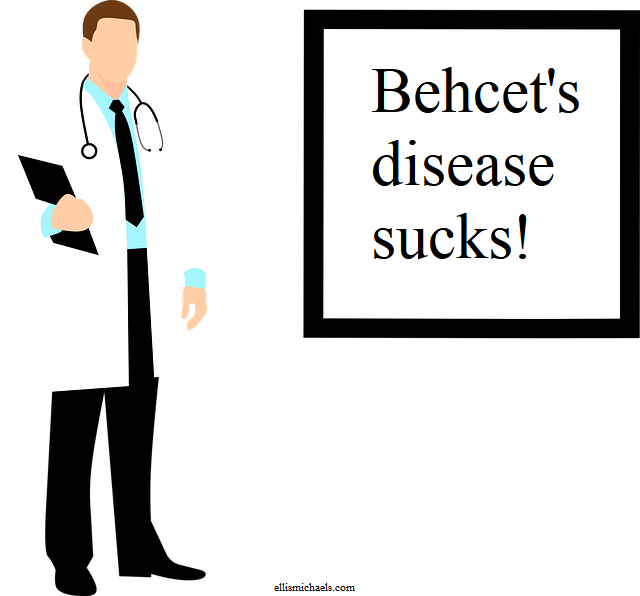If you ask someone who has Behcet’s disease to list their symptoms, you’re likely to hear a bunch of words that end in -itis. But there’s a good chance you’re also going to hear words like depression, anxiety, and others associated with mental illness.
When you’re living with a body that attacks itself for no apparent reason, the mind often follows. Living with Behcet’s disease – or any autoimmune disease, for that matter – can feel like a constant struggle to keep your head above water. You never know what symptoms are lurking beneath the surface just waiting to pull you under.
Behcet’s disease and mental illness often go hand-in-hand. It’s not uncommon for people diagnosed with Behcet’s to also suffer from one-or-more mental illnesses as well. In this article, we’re going to look at some of the most-common mental illnesses Behcet’s sufferers experience. And then I’m going to tell you about some things you can do to improve your mental health.
Behcet’s Disease and Mental Illness
Table of Contents
By the time I started college, I’d already wracked up several diagnoses. In addition to Behcet’s disease, I was also diagnosed with major depressive disorder (MDD) and generalized anxiety disorder (GAD). My entire teenage years were filled with depression and anxiety. My mental health – or lack thereof – had such a strong effect on me that I chose one of my majors (I double-majored) because on it.
Before going to grad school for clinical psych, I majored in psychology with a concentration in medical psych as an undergraduate. I chose that major and concentration because I desperately wanted to figure out what the hell was wrong with me. All the time, I felt like shit. I just wanted to figure out how to feel normal.
While still an undergrad, I remember learning about how people with chronic illnesses have a higher rate of mental illness than the general population. This didn’t make me feel any better. But it did make me realize I wasn’t the only one dealing with both a physical illness and one-or-more mental illnesses.
Mental illness is so common among people with chronic illnesses that simply being diagnosed with one is considered a risk factor. According to the Centers for Disease Control and Prevention (CDC), having a chronic disease is among the top risk factors for developing some form of mental illness. Other risks factors the CDC mentions include a family history of mental illness, stressful life conditions, childhood abuse or neglect, lack of social support, illegal drug use, and a history of traumatic experiences.1
While having a chronic illness is a risk factor for developing some mental illness, certain ones are more common than others. The same few mental health problems are commonly seen in people diagnosed with a chronic condition whether that condition is Behcet’s, another autoimmune disease, or some other chronic health issue. Let’s take a look at some of the most-common mental illnesses Behcet’s sufferers deal with.
1. Depression/Mood Disorders
One of the most-common forms of mental illness Behcet’s disease sufferers experience is depression and other affective (mood) disorders. Of course, you don’t need to be diagnosed with a chronic health condition to be depressed. Major depressive disorder and other mood disorders are among the most-common mental illnesses. Up to 10% of the general adult population suffers from some type of mood disorder on any given year. And over 1/5 of the population (21.4%) will experience a mood disorder at some point during their lifetime.2
As common as mood disorders are among the general population, they’re even more common among those of us diagnosed with Behcet’s disease and other chronic illnesses. One study found that of all people being admitted to a hospital (for whatever reason), between 13-17% of them had an affective disorder. But out of people diagnosed with chronic conditions being admitted to a hospital, that percentage jumps to between 20-25%.3
If you’ve been diagnosed with Behcet’s disease, you’re probably all-too aware of the symptoms of depression. Perhaps you’re experiencing several of them right now as you read this. Here are some of the symptoms commonly associated with major depressive disorder (MDD):4
- Depressed mood (no shit!)
 Reduced interest and pleasure in all or most activities
Reduced interest and pleasure in all or most activities- Significant weight loss (when not dieting) or weight gain
- Slowed thinking
- Reduction in activity/physical movement
- Fatigue
- Excessive feelings of guilt and worthlessness
- Difficulty concentrating and making decisions
- Frequent thoughts of death or of committing suicide
Have you experienced any of those symptoms of depression? Maybe, like me, you’ve experienced all of them. I hope for your sake that you haven’t. But a lot of us Behcet’s Warriors have plenty of experience battling depression in addition to our rare autoimmune disease.
Other mood disorders, though less common, are also seen in people with Behcet’s disease. These can include things like bipolar disorder (formerly called manic depression), dysthymia (a persistent depressive disorder), premenstrual depressive disorder (aka PMDD, a more-severe form of premenstrual syndrome, aka PMS), and others. But regular, good ol’ fashioned major depression is more-commonly seen in people with Behcet’s than any of these disorders.
It’s not hard to imagine why depression is so common among those of us with Behcet’s disease. Dealing with chronic pain, not being able to do the things we used to be able to, feeling like we’re different than everyone else, and about a hundred other depression-causing reasons can easily be pointed to. And then there’s always the possibility that our depression is being caused by Behcet’s directly.
Neuro-Behcet’s disease (NBD) affects anywhere from 5-50% of people diagnosed with Behcet’s.5 NBD is when there is neurological involvement in addition to regular Behcet’s symptoms. Potential neurological symptoms include movement disorders, multiple-sclerosis-like presentations, blood clots in the brain (cerebral venous sinus thrombosis aka CVST), intracranial hypertension, and personality changes.6
Although depression is not usually listed as a symptom of neuro-Behcet’s disease, it definitely could be one. It’s well-known that depression and inflammation in the brain go hand-in-hand.7 Central nervous system inflammation caused by neuro-Behcet’s could certainly lead to depression and other mental illnesses.
Whether its cause is psychological or biological, depression is something many of us diagnosed with Behcet’s disease have to deal with. As someone who’s spent years at a time severely depressed, let me tell you: it sucks. Fortunately, my mental health has been good for a very long time. Aside from the mild seasonal depression I experience every fall/winter, I’ve managed to keep my mood stable for many years.
I’ll share some mental health tips that have kept me depression-free shortly. But first, let’s look at another mental illness Behcet’s-disease sufferers commonly experience.
2. Anxiety Disorders
As common as depression and other affective disorders are, anxiety disorders are even-more common. In fact, anxiety disorders are the most-common mental illness in the United States. Roughly 40-million American adults (18.1% of the population) are diagnosed with an anxiety disorder every year.8 Here are the different types of anxiety disorders and the percentage of American adults who experience them every year:9
 Specific phobia – 7-9%
Specific phobia – 7-9%- Social anxiety disorder (SAD) – 7%
- Panic disorder – 2-3%
- Agoraphobia – 2%
- Generalized anxiety disorder (GAD) – 2%
- Separation anxiety disorder – 1-2%
As you’re likely aware if you’re living with Behcet’s or some other autoimmune disease, having a chronic illness can be extremely anxiety provoking. You’re always worrying about what symptoms might be lurking around the corner and when they’ll hit. Unsurprisingly, those of us diagnosed with Behcet’s disease experience anxiety disorders even more than the general population.10
So, what exactly is anxiety? It’s a feeling of worry, unease, or nervousness. Some anxiety is good. If you hear a loud bang outside your home, it’s good to perk up and worry about where it came from. If your child doesn’t come home when they’re supposed to, it’s good to worry about where they might be. Anxiety serves an important function in our lives, keeping us on our toes and protecting us from potential threats.
But when that anxiety gets out of control, it can become a big problem. Excessive worrying, especially about things that are unlikely to ever happen, can impair functioning and mess up your life. When anxiety gets to the point where it’s negatively affecting your well-being, it’s considered an anxiety disorder.
I won’t get into the specifics of each anxiety disorder, but they all involve excessive worry that impairs normal functioning. And, as mentioned above, anxiety disorders are more common in people with Behcet’s than the general population. They’re even more common than depression.
A study published in 2019 looked at depression and anxiety in patients with Behcet’s disease.11 It compared 155 people diagnosed with Behcet’s with 107 healthy volunteers. This study found that 40.6% of participants with Behcet’s disease had depression and 43.2% had anxiety. That’s almost half of us! This same study also found that anxiety levels are higher when the disease is more active.
Other studies have shown similar results. A 2009 study compared 195 patients with Behcet’s disease to 195 healthy volunteers.12 This study found that people with Behcet’s scored lower on all quality of life (QOL) measures and had more anxiety. The researchers also noted that there was a direct correlation between severity of Behcet’s symptoms and QOL scores. The more severe the Behcet’s symptoms, the lower the quality of life score.
Severe anxiety can be crippling. For years, I was overwhelmed with both depression and anxiety. But I certainly wasn’t the only one. Depression and anxiety disorders often go together. One study found that 85% of people diagnosed with major depressive disorder (MDD) also met the criteria for generalized anxiety disorder (GAD).13 The same study also found that 35% of people diagnosed with MDD also have symptoms of panic disorder. This is hardly surprising, though. Being depressed all the time can be worrying. And being anxious all the time can be depressing.
Mood-and-anxiety disorders are by far the most common mental illnesses Behcet’s disease sufferers experience. But they’re not the only ones. Let’s just briefly touch upon a couple of other mental illnesses Behcet’s patients can experience.
Behcet's Disease Uncensored (BDU) is a podcast to discuss this rare illness.
Behcet's doesn't censor itself when it attacks our bodies. So why should we censor ourselves when discussing it?
Listen to BDU on Spotify or wherever you listen to podcasts.
3. Substance Use Disorders
Here’s yet another mental illness I have experience with. When I was in my teens and the Behcet’s was at its worst, I was in a lot of pain – physical pain. That’s in addition to the mental pain I felt everyday. Back then, in the 1990s and early-2000s, opioids were handed out like candy. Several of my doctors would throw prescription after prescription of powerful painkillers at me. It didn’t happen overnight but, after a few years, I developed an addition to these potent pain relievers.
 Pain, depression, and anxiety are all known to be linked to addictive disorders.14 Roughly 1/3 (32%) of chronic pain patients also experience a substance use disorder.15 Like many of the statistics we’ve looked at, this is hardly surprising. Being depressed, anxious, and/or in pain sucks. Experiencing two-or-more of them can be unbearable.
Pain, depression, and anxiety are all known to be linked to addictive disorders.14 Roughly 1/3 (32%) of chronic pain patients also experience a substance use disorder.15 Like many of the statistics we’ve looked at, this is hardly surprising. Being depressed, anxious, and/or in pain sucks. Experiencing two-or-more of them can be unbearable.
Those of us with Behcet’s disease and other painful, chronic illnesses want to feel decent just like anybody else. I can’t speak for everyone but, when I was hooked on opioids, I wasn’t trying to get high. I just wanted to not feel so damn low. All I wanted was to feel normal. The same was true with alcohol. I drank because it significantly reduced my anxiety and often improved my mood.
Though I could not find any scientific papers that explored the link between Behcet’s disease and substance abuse directly, we can safely assume such a link exists. Since we know depression, anxiety, and pain are all associate with Behcet’s and also with substance use disorders, it’s not hard to imagine that a direct link exists.
It’s been many years since I’ve taken any opioids. And I’m in my 8th year without any alcohol. I can honestly say they’ve been the best 8 years of my life. But I don’t claim to be 100% clean and sober. I now use things like cannabis and kratom to improve mood, decrease anxiety, and reduce pain. But these things have caused me zero problems, unlike alcohol and opioids.
4. Insomnia/Sleep-Wake Disorders
The last on our mental-illness-and-Behest’s-disease list is, once again, something I’m very familiar with: insomnia and other sleep-wake disorders. Insomnia, in case you’re not familiar with that term, just means difficulty sleeping. This can include trouble falling asleep and staying asleep.
 Going all the way back to childhood, I can remember having bouts of insomnia. Sometimes it would just be a night or two. Other times, I’d struggle to fall and stay asleep for weeks on end. Even to this day, I still have the occasional bout of insomnia. Fortunately, now I have several prescription-and-over-the-counter (OTC) remedies that I can take when my insomnia kicks up. You can read about some of them here: 5 Home Remedies For Behcet’s Disease.
Going all the way back to childhood, I can remember having bouts of insomnia. Sometimes it would just be a night or two. Other times, I’d struggle to fall and stay asleep for weeks on end. Even to this day, I still have the occasional bout of insomnia. Fortunately, now I have several prescription-and-over-the-counter (OTC) remedies that I can take when my insomnia kicks up. You can read about some of them here: 5 Home Remedies For Behcet’s Disease.
Just like with substance abuse, Behcet’s disease and insomnia haven’t been studied together directly. However, it is well-known that insomnia is common in people diagnosed with a mental illness, especially anxiety-and-affective disorders like GAD and MDD.16 And it has also been established that people with chronic, painful rheumatic diseases (like Behcet’s) frequently experience insomnia and, as a result, daytime sleepiness and fatigue.17
Like numbers 1-3 on our list of common mental illnesses found in people with Behcet’s disease, there are no surprises here. If you feel like crap most or all of the time, there’s a good chance you’ll have trouble getting restful sleep every night.
5. Other Mental Illnesses
Can people with Behcet’s disease have any other mental illnesses? You bet they can. We’re just as susceptible to having them as anyone else. However, the 4 mental illnesses listed above are the ones most-commonly found in people diagnosed with Behcet’s. But personality disorders, dissociative disorders, obsessive-compulsive disorders (OCD), sexual dysfunctions, and other mental illnesses are all possible.
Now that we’ve taken a look at some commonly found mental illnesses in Behcet’s-disease patients, here are some mental-health tips that can help improve your life. I should mention: these aren’t meant to be a substitute for professional help. If you’re suffering from a severe mental illness that’s negatively affecting the quality of your life, tell your doctor.
A Few Mental-Health Tips
Here are a few things you can do to stay on top of your mental health. While they won’t guarantee you’ll stay mental-illness free, they can definitely help. They’re all things I have done and/or currently do myself.
1. Exercise

I understand that not everyone with Behcet’s disease is physically capable of exercising. But if you are, you should. Starting and sticking to a workout routine has dramatically improved my quality of life. When I got my first gym membership 13-years ago, I couldn’t even bench press my own body weight and could only walk – that’s right, walk – on the treadmill for 5 minutes before feeling exhausted. Now, after years of regular exercise, I can bench several times my weight and run for an hour straight.
Getting in shape has definitely improved my mood and reduced overall anxiety levels. But I’m not alone. There is plenty of science that shows exercise – or simply activity in general – can significantly decrease they symptoms of depression and anxiety. Several studies even show that exercise is as effective at treating depression as prescription antidepressants.18
If you’re not used to exercising, start off small. Even a 5-minute walk is better than no walk. Generally, any activity is good activity. Try to get as much exercise as you can at least a few times a week. Some benefits will be noticeable right away while others take time to develop.
2. Diet/Nutrition
You’re probably already aware that improving your diet can improve the way you feel. What we put in our bodies – foods, liquids, drugs, and whatever else – affect how we look, feel, and how our bodies function. If all you eat is high-sugar, high-salt, low-nutrient, highly-processed foods, you’re probably not going to look and feel as good as you could if you chose healthier alternatives.
I’ll be the first to admit: my diet isn’t perfect. But it’s a whole-lot better than it used to be. And ever since I cleaned up my diet, my mood’s been better, I’ve had more energy, I look better, and my anxiety levels are lower.
A number of studies have shown that dietary changes can affect mood, anxiety, and plenty of other aspects of mental health.19 Fortunately, your diet doesn’t have to be perfect to reap some of these rewards. Here are just a few small dietary changes you can make that may have a big impact on your mental health:
 Eat more lean meats (chicken, turkey, fish, etc.)
Eat more lean meats (chicken, turkey, fish, etc.)- Eat more fruits and vegetables
- Use less sugar and cream in coffee/tea
- Drink low-sugar/sugar-free beverages
- Limit fast food to once-or-twice a week at most
- Eat less frozen/processed meals
- Substitute healthier snack alternatives (protein chips instead of potato chips)
3. Reach Out and Connect With Others
This one is super important. When I was diagnosed with Behcet’s disease in the 1990s, social media didn’t exist. I had no way to connect with other people who shared my diagnosis. As a result, I felt incredibly alone. And that loneliness was definitely a major contributor to both my depression and anxiety.
 Fortunately, nowadays social media does exist. And it’s a great way to meet other people who have Behcet’s disease and other chronic illnesses. It’s also a great way to meet others who share the same mental-illness diagnoses as you. There are Facebook groups dedicated to Behcet’s disease, a Reddit forum, and other places you can go to connect with other Behcet’s Warriors.
Fortunately, nowadays social media does exist. And it’s a great way to meet other people who have Behcet’s disease and other chronic illnesses. It’s also a great way to meet others who share the same mental-illness diagnoses as you. There are Facebook groups dedicated to Behcet’s disease, a Reddit forum, and other places you can go to connect with other Behcet’s Warriors.
Having Behcet’s disease used to make me feel incredibly lonely. Now? Not at all. In fact, some of the most-meaningful friendships I have in my life are with others diagnosed with Behcet’s. I met all of them online. But those friendships only developed after I took that necessary first step – I reached out. Don’t be afraid to join one-more-more Behcet’s communities so you can start connecting with others who share the diagnosis.
4. Keep A Journal
 The last thing I suggest you do to stay on top of your mental health is keep a journal. Sometimes writing down how you feel can make a big difference. Just getting your thoughts and feelings out of your head and onto the page where you can see them can be therapeutic. Studies have actually shown that keeping a journal can improve the well-being of people with medical conditions.20
The last thing I suggest you do to stay on top of your mental health is keep a journal. Sometimes writing down how you feel can make a big difference. Just getting your thoughts and feelings out of your head and onto the page where you can see them can be therapeutic. Studies have actually shown that keeping a journal can improve the well-being of people with medical conditions.20
Your journal can be as simple or as detailed as you’d like. Even jotting down a few words about how you’re feeling everyday can make a difference. Of course, you’re welcome to write as much as you want. You actually don’t even have to write at all. If you either can’t write or simply don’t like to, you can keep an audio journal.
Voice-recognition software has come a long way in recent years. If you’re unable to keep a regular journal because you’ve lost your vision to Behcet’s, joints ache too badly to hold a pen or type, or some other reason, a voice diary is a great alternative. The only thing that matters is you’re getting your feelings out. It doesn’t matter how you get them out, as long as you do somehow.
Conclusion
As we’ve seen, Behcet’s disease and mental illness often go hand-in-hand. Living with a body that attacks itself for no good reason can lead to depression, anxiety, substance abuse, and other mental illnesses. Fortunately, there are things you can do to help improve your mental health including the tips mentioned above.
If you’re severely depressed, anxious, or mentally unwell in general, you should consult a mental-health professional. Medication, psychotherapy, or a combination of the two can be highly effective at treating many mental illnesses. Don’t suffer needlessly. There’s no shame in getting help.
If you’d like to learn more about both my mental-health and Behcet’s-disease journeys, I wrote a book about them. It’s called Finding Happiness Through Pain and Embarrassment: My Life With Behcet’s Disease – A Memoir and it’s available wherever books are sold.
Join the Ellis Michaels mailing list to get notified about new Behcet's disease articles and publications, up-to-date news and info about this rare illness, and more.
References
1Mental health and chronic diseases. (2012, Oct.). Centers for Disease Control and Prevention. Retrieved December 12, 2020 from https://www.cdc.gov/workplacehealthpromotion/tools-resources/pdfs/issue-brief-no-2-mental-health-and-chronic-disease.pdf
2Any mood disorder. (2017, Nov.). National Institute of Mental Health. Retrieved December 12, 2020 from https://www.nimh.nih.gov/health/statistics/any-mood-disorder.shtml
3Turner, J., & Kelly, B. (2000). Emotional dimensions of chronic disease. Western Journal of Medicine, 172(2):124-8.
4American Psychiatric Association. (2013). Depressive disorders. In Diagnostic and statistical manual of mental disorders (5th ed.). Washington, DC: American Psychiatric Association.
5Farah, S., Al-Shubali, A., Montaser, A., et al. (1998). Behcet’s syndrome: a report of 41 patients with emphasis on neurological manifestations. Journal of Neurosurgery & Psychiatry, 64(3):382-4.
6Borhani-Haghighi, A., Kardeh, B., Banerjee, S., et al. (2019). Neuro-Behcet’s disease: an update on diagnosis, differential diagnoses, and treatment. Multiple Sclerosis & Related Disorders.
7Kiecolt-Glaser, J., Derry, H., & Fagundes, C. (2015). Inflammation: depression fans the flames and feasts on the heat. American Journal of Psychiatry, 172(11):1075-91.
8Facts & statistics. (n.d.). Anxiety & Depression Association of America. Retrieved December 16, 2020 from https://adaa.org/about-adaa/press-room/facts-statistics
9What are anxiety disorders? (2017). American Psychiatric Association. Retrieved December 16, 2020 from https://www.psychiatry.org/patients-families/anxiety-disorders/what-are-anxiety-disorders
10Ilhan, B., Can, M., Alibaz-Oner, F., et al. (2018). Fatigue in patients with Behcet’s syndrome: relationship with quality of life, depression, anxiety, disability and disease activity. International Journal of Rheumatic Diseases, 21(12):2139-45.
11Sandikci, S., Colak, S., Omma, A., et al. (2019). An evaluation of depression, anxiety, and fatigue in patients with Behcet’s disease. International Journal of Rheumatic Diseases, 22(6):974-9.
12Ertam, I., Kitapcioglu, G., Aksu, K., et al. (2009). Quality of life and its relation with disease severity in Behcet’s disease. Clinical & Experimental Rheumatology, 27(2 Suppl 53):S18-22.
13Tracy, N. (2012, Jan. 3). Relationship between depression and anxiety. Healthy Place. Retrieved December 17, 2020 from https://www.healthyplace.com/depression/anxiety-and-depression/relationship-between-depression-and-anxiety
14Conway, K., Compton, W., Stinson, F., et al. (2006). Lifetime comorbidity of DSM-IV mood and anxiety disorders and specific drug use disorders: results from the National Epidemiologic Survey on Alcohol and Related Conditions. Journal of Clinical Psychiatry, 67(2):247-57.
15Chelminski, P., Ives, T., Felix, K., et al. (2005). A primary care, multi-disciplinary disease management program for opioid-treated patients with chronic non-cancer pain and a high burden of psychiatric comorbidity. BMC Health Services Research, 5(1).
16Roth, T., & Roehrs, T. (2003). Insomnia: epidemiology, characteristics, and consequences. Clinical Cornerstone, 5(3):5-15.
17Mahowald, M., & Mahowald, M. (2000). Nighttime sleep and daytime functioning (sleepiness and fatigue) in less well-defined chronic rheumatic diseases with particular reference to the ‘alpha-delta NREM sleep anomaly’. Sleep Medicine, 1(3):195-207.
18Strohle, A. (2009). Physical activity, exercise, depression and anxiety disorders. Journal of Neural Transmission, 116:777-84.
19Rao, T., Asha, M., Ramesh, B., et al. (2008). Understanding nutrition, depression and mental illness. Indian Journal of Psychiatry, 50(2):77-82.
20Smyth, J., Johnson, J., Auer, B., et al. (2018). Online positive affect journaling in the improvement of mental distress and well-being in general medical patients with elevated anxiety symptoms: a preliminary randomized controlled trial. JMIR Mental Health, 5(4).








Leave a Reply